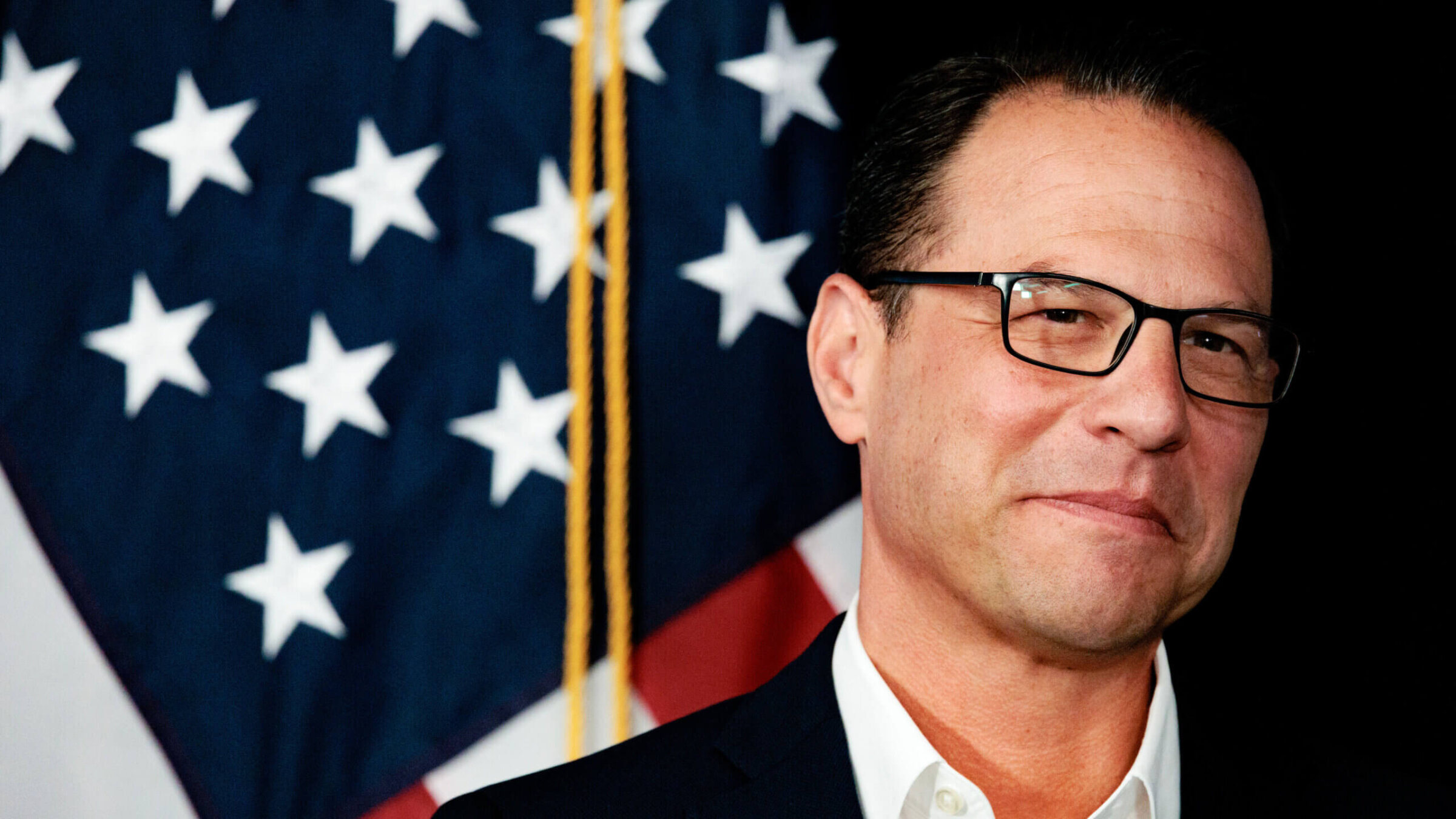Why Josh Shapiro would help Kamala Harris win over the most voters
The Jewish governor of Pennsylvania enjoys bipartisan popularity and a proven track record of effective leadership

Josh Shapiro, governor of Pennsylvania, during a news conference in Philadelphia, Pennsylvania, July 30. Photo by Hannah Beier/Bloomberg via Getty Images
“I stand before you, a proud American of Jewish faith,” Josh Shapiro told the crowd at his gubernatorial inauguration in 2023. He had just taken the oath of office over a Torah recovered from the Tree of Life synagogue, where 11 Jews were murdered during Shabbat services by a white nationalist.
Shapiro’s centering of both his Jewish identity and the violent reality of antisemitism was a powerful symbolic victory of life over death, of unity over bigotry and of Jews being able to participate in public service unconditionally.
It is the kind of symbolism that would greatly benefit the Kamala Harris campaign as it competes in must-win Pennsylvania. Yet Shapiro, who beat a Christian nationalist in a landslide in 2022, is facing backlash from pro-Palestinian activists who are picking apart his statements on campus antisemitism and complaining about his support for Israel. In choosing Shapiro, a politician with bipartisan popularity and a stellar record as governor, Harris would ensure her ticket targets real voters, rather than tailoring its messaging to the whims of internet leftists who make the perfect the enemy of the good.
When then-state attorney general Shapiro ran for governor in 2022, he ran on issues such as protecting voting rights, improving public education, and addressing the state’s opioid crisis. His Republican opponent, Doug Mastriano, a state senator and retired Army colonel endorsed by Donald Trump, ran on relitigating the 2020 presidential election results, banning abortion and opposing public health efforts to reduce COVID-19 transmission.
Their contest was in many ways a trial run for the 2024 presidential campaign. Shapiro’s political instincts and campaigning stamina proved strong. He hammered Mastriano on his extreme positions. He campaigned all over Pennsylvania, a state with a larger land mass than South Korea. He convinced Republicans to cross the aisle to endorse him.
Shapiro did all of this while his opponent did the exact thing many Jews worry about when contemplating a Jewish candidate: Mastriano demonized Shapiro’s Jewish day school education, labeling him out of touch and elitist, and openly sought the support of white nationalists both online and in Pennsylvania.
Shapiro could have downplayed his Jewishness. He could have avoided the issue entirely. Instead, he leaned into his Jewish identity. He paraphrased Talmud in his kick-off speech. He talked about his faith, Shabbat and kashrut. He campaigned as a proud Jew and was rewarded with a 15-point victory, 56.5% of the vote to Mastriano’s 41%. Before he moved into the governor’s mansion, he made its kitchen kosher.
Shapiro’s competence extends well beyond campaigning. When a major national highway was shut down because of an overpass collapse following an accident in Philadelphia, Shapiro mobilized the state bureaucracy. Initial estimates put the repair at months; Shapiro’s administration got it done in 12 days. He understood that a public servant’s job is serving the public and he understood the levers to pull to make it happen.
This was not the only time Shapiro used the formal and informal power of the state to serve his constituents. As antisemitic harassment, vandalism and violence exploded on college campuses across the country after the Oct. 7 Hamas terror attack on Israel, the University of Pennsylvania in Philadelphia was no exception. Shapiro led the way in holding the university to account, publicly pushing it to clear the encampment on a Thursday. The next day, after months of antisemitic harassment, including targeted threats to individual Jewish students and staff, the university did.
Despite Shapiro’s accomplishments, there is a small and very online contingent of anti-Israel leftists who are vehemently against his potential selection, claiming that he opposes a ceasefire and has “anti-Palestinian” views. The talking points of this contingent fixate on Shapiro’s support for Israel and his condemnation of antisemitic behavior expressed by encampment protesters. In an interview with CNN he affirmed the activists right to protest peacefully but drew a sharp line against antisemitic incitement: “We can’t allow peaceful protests about a disagreement on policy happening in the Middle East to be an excuse for antisemitism or Islamophobia.”
This position is consistent with where the majority of the public stands on peaceful protest versus incitement. It is also an example of Shapiro’s ability to use his platform to combat antisemitism in ways that many non-Jewish voters can easily agree with. Far from being a liability for Shapiro, his openly proud Jewish identity and pro-Israel bona fides will neutralize attacks that former President Donald Trump has been making on Harris for being insufficiently pro-Israel.
Election experts generally say that vice presidential picks do not meaningfully change voting habits. This is true, but ignores the importance of the the electoral college, where studies show that the bias against Democrats continues to widen. As of 2020, Democrats need to win the popular vote by more than 4% to be competitive in the electoral college.
Democrats running for president therefore need to optimize their campaigns for electoral college wins. Biden won Pennsylvania in 2020 by 80,555 votes out of more than 6.8 million cast. Polling since Harris became the presumptive nominee show her tying or running slightly behind Trump in key states such as Michigan, Wisconsin and Pennsylvania.
Shapiro, who enjoys bipartisan popularity and the approval of 61% of all Pennsylvania voters, offers the surest path to the state’s 19 electoral votes. Online leftists who argue his pro-Israel position will hurt him should consider Pennsylvania’s nearly half a million Jewish voters, which could be the difference between Harris winning or losing not just Shapiro’s state but the presidency.
Correction: An earlier version of this piece incorrectly referred to Josh Shapiro as Pennsylvania’s first Jewish governor. Milton Shapp was the first Jewish governor of Pennsylvania.

















